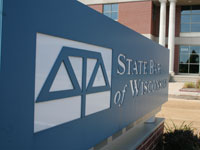 Dec. 16, 2009 – At the Dec. 4 Board of Governors meeting, four candidates began candidacies to become the 2010 State Bar president-elect. They are James “Jim” M. Brennan, Catholic Charities; Sarah “Sally” Fry Bruch, Crivello Carlson S.C.; Margaret Wrenn Hickey, Becker & Hickey S.C.; and Jay A. Urban, Urban & Taylor S.C., all of Milwaukee. The president-elect serves a one-year term before becoming president.
Dec. 16, 2009 – At the Dec. 4 Board of Governors meeting, four candidates began candidacies to become the 2010 State Bar president-elect. They are James “Jim” M. Brennan, Catholic Charities; Sarah “Sally” Fry Bruch, Crivello Carlson S.C.; Margaret Wrenn Hickey, Becker & Hickey S.C.; and Jay A. Urban, Urban & Taylor S.C., all of Milwaukee. The president-elect serves a one-year term before becoming president.
Each candidate was asked (1) why members should choose him or her and (2) what is the most pressing issue confronting the bar today. Their responses follow.
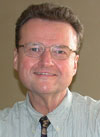
Jim Brennan
Why choose this candidate?
I believe the bar must advance its mission to serve the professional interests of its members and fulfill the purposes for which it is organized under Supreme Court Rule 10.02(2). I bring to bar leadership 30 years experience as a trial lawyer and nonprofit management with oversight of a law office. Policy questions surrounding the future of the integrated bar will be placed before the Board of Governors in 2010. As this year’s Board chair, I am committed to a full board review and resolution of policy issues raised by the integrated bar. As president-elect, I would work with other bar leaders to implement the Board’s decision and move the bar forward on its strategic plans.
Whether integrated or voluntary, the purposes of an organized bar need to be advanced. I have been an active member of the bar since 1976, serving in bar governance roles the past 14 years. Because of bar involvement, I have dealt with many of the recurring issues facing the profession. The negative public image of lawyers, particularly the criminal defense role, requires regular attention to correct public misapprehensions about the defense role within the justice system. At its December meeting, the Board of Governors adopted a resolution supporting the role of criminal defense counsel in the justice system. For seven years I served as chair of the Indigent Defense Committee, a special committee formed to educate the public and the Legislature of the criminal defense role, to support private bar involvement in the public defender program, and to provide bar support for high-quality indigent defense work. A renewed commitment of bar support for the indigent defense function is warranted.
Most pressing issue?
The most pressing issue for the State Bar is its future as an integrated bar. Supreme Court Rule 10.10, authorizes the court to review from time to time the performance of the bar in fulfilling its public purposes. This performance review of the integrated bar is long overdue. That said, I firmly believe the outcome of that review would conclude that the State Bar has performed sufficiently to warrant continued integrated status.
Surveys, questionnaires, and general discussion of the integrated bar commonly use words like “voluntary,” “involuntary,” “coerced,” or “compelled” to describe the relationship with the association and the requirements of supreme court regulation. When presented in these terms, I appreciate the number of lawyers who choose “voluntary” and move on. For me, the integrated bar question raises not only a question of individual liberty but of professional responsibility. We have taken a lawyer’s oath to uphold special responsibilities to clients, the courts, and the public. We are privileged to represent people before the court. An association of lawyers is unlike other professions, associations, or trade groups.
Bar associations no longer provide a vehicle to discipline members, but its programs and services protect the public and serve the lawyers. Wisconsin Lawyer Assistance Program (WisLAP) and the Law Office Management Assistance Program support the regulatory function and serve the interests of lawyers and clients. Those programs allow lawyers to get assistance from peers and protect the client community from lawyer malpractice.
Local voluntary bars, like my own Milwaukee Bar Association, offer extraordinary programs for member involvement in pro bono and in support of the courts. The Milwaukee Justice Center is such an ambitious undertaking. The State Bar, because of its statewide reach and membership, can undertake and coordinate actions to improve the justice system on a statewide basis. The State Bar, like many bar associations, do market studies. The State Bar, however, acting to assist the supreme court in improving the delivery of legal services and also upholding the profession’s obligations, undertook a comprehensive, statistically valid survey of Wisconsin’s unmet legal needs. Not only did the State Bar initiate that study, it petitioned the supreme court with its findings and recommendations to improve access to justice. The bar also set aside a $300,000 reserve to support an Access to Justice Commission in its formation and organizational phase. Even as an integrated bar, this is a major undertaking. Yet this access to justice work goes to the core of what the State Bar should be doing for the people of Wisconsin.
The State Bar needs to educate and protect the public who need legal services, and not leave people unprotected from the unscrupulous. At Catholic Charities, our staff lawyers and pro bono lawyers provide immigration legal services to many clients from Mexico. In Mexico, “notarios” are fully authorized to help you if you have an immigration problem. In Wisconsin, we have lawyers to practice law, notary publics to administer oaths and notarize documents, but nothing like a “notario” or “solicitor.” We have found in Milwaukee, some of these notary publics hold themselves out as “notarios,” preying on unsuspecting and confused people with immigration problems. These “notarios” take money, often do great and permanent harm to the person’s actual legal rights, and sometimes do no work at all. The State Bar’s unauthorized practice of law petition, recently reaffirmed by the Board of Governors, asks for meaningful relief for those who are victims of this type of predatory consumer fraud and unauthorized practice of law. I see this as a high priority for the State Bar, the profession, and for me.
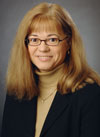
Sally Fry Bruch
Why choose this candidate?
Among the candidates, if elected, I will bring a unique perspective to the position that comes from having spent over half of my career as a lawyer working outside of Milwaukee, in a variety of practices. After graduation from Marquette Law School in 1986 (my class was 33% women), I practiced in small general practices in Milwaukee and Wausau, then as an assistant district attorney for Portage County in Stevens Point, and after that in part-time solo private practice. After a six-year hiatus from law practice during which my family moved four times, including out-of-state moves to Atlanta and Houston, we returned to Wisconsin in 2002. Since that time I have been an associate attorney, and in 2008 became a shareholder, at Crivello Carlson, S.C., a 31- attorney civil litigation firm in Milwaukee.
During my six-year “hiatus” from law practice, I kept my license “active,” continued to receive and read the Wisconsin Lawyer, and found the annual State Bar conventions an extremely efficient and economical way to earn required CLE credits. I enjoyed seeing my former colleagues at those conventions, all of which kept me connected to the practice of law in Wisconsin. As lawyers, I believe we need a bar that helps us tool our practice with cost effective, high quality CLE programs, a bar that’s responsive to our requests for programming, because we need to serve our clients regardless of the location, size or type of our practice.
Practicing in central Wisconsin early in my career reinforced my core values of civility and respect between lawyers. At that time, Portage County only had 56 lawyers, and though the same lawyers opposed each other (in different matters) over and over again, they all sat down together for county bar association annual dinners and outings, holiday events, couples dinners and monthly meetings. I think it’s time for the bar to revisit civility and respect between lawyers, and the responsiveness of State Bar staff to lawyer members. If elected, I intend to poll members on these issues, and take steps to initiate any action indicated. Our bar needs to respond to us, and we need to exemplify civility and respect amongst ourselves to earn the respect of the public we serve.
My main involvement in the bar includes serving on the at-large Diversity Outreach Committee since 2003, this year as chair. I was involved in developing the 2009 Diversity Counsel Program CLE, "Focus on Minority and Women-Owned Law Firms," and the 2008 Diversity Counsel Program CLE, “Ethical Issues of Bias.” In 2006, I served as subcommittee chair for the State Bar Convention Diversity Outreach-Gender Equity CLE, “The Challenges, Strategies and Ethics of Recruiting and Retaining a Diverse Workforce.” We brought in Circuit Court Judge James Mason of Wood County as the “out state” voice for the panel discussion portion of the program. I’ve also served on the Professionalism Committee and the (now-defunct) Gender Equity Committee.
Most pressing issue?
Voluntary/Mandatory Bar. This issue continues to be in the forefront of this election. The Strategic Planning Committee has been surveying members and holding public hearings. Its report and recommendations will be delivered to the Board of Governors (BOG) this February. A BOG vote on whether to petition our supreme court is expected by June 2010. If a petition goes forward, it will be up to the supreme court to decide whether to amend SCR 10.01(1), which currently states that bar membership “shall be a condition precedent to the right to practice law in Wisconsin.”
Our neighboring states Illinois, Iowa, and Minnesota have voluntary bars, as do 15 others – Indiana, Ohio, Pennsylvania, New York, New Jersey, Connecticut, Massachusetts, Vermont, Maine, Delaware, Maryland, Tennessee, Arkansas, Kansas, and Colorado. I personally support a voluntary bar.
Whether our bar remains mandatory or becomes voluntary, Wisconsin lawyers need a Bar that is not only responsive to, but is shaped by the needs of its members. If elected, during the three years that I serve as president-elect, president, and past-president, I will continue the practice of current president-elect Jim Boll to meet with each local bar annually, and hold semi-annual meetings with local bar presidents throughout the state, and his requirement that BOG members be required to attend local bar meetings in their districts. With a membership of 23,000 lawyers, it is imperative that bar leadership is aware of and responsive to issues facing lawyers in each district.
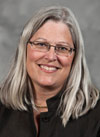
Margaret Hickey
Why choose this candidate?
I would like to serve as State Bar president elect to continue the bar’s work in providing the efficient delivery of relevant and valued services to State Bar members. It would be an honor to serve as president elect. My work with the bar has been primarily in sections as chair of the Elder Law Section (1998-99) and chair of the Family Law Section (2002-03). I worked to help create the Elder Law Section Workshop and will moderate the 12th annual program this year. I also currently serve on the Board of Governors (board chair, 2006-07), and I am currently the State Bar treasurer. In addition, I have been active in local bar issues serving on the Milwaukee Bar Association (elected as president 2004-05) and on the Legal Aid Society Board in Milwaukee.
My work with the sections and board gives me a breadth of experience in how the bar functions, areas that could be improved, and an understanding of the diverse constituencies that the bar must serve. Regardless of the outcome of the mandatory or voluntary bar debate, the bar will continue to serve thousands of attorneys and it must do so mindful of the needs of members and our duty to serve the public. I believe that I have the skills to act as a steward of the organization in the future, whether the bar continues to be mandatory or becomes a voluntary organization.
Most pressing issue?
The most pressing issue facing members is the delivery of competent, quality, and ethical legal services in a challenging economy. All attorneys, even those not in private practice, are faced with how to continue to deliver the services we have in the past with fewer resources. Attorneys in solo, small, or large firm practices, government or corporate settings are all working harder to earn a living and to produce quality services at a lower overhead cost than in the past. The State Bar’s job is to assist attorneys with this task by providing relevant CLE, products, practice resources, and a forum to work with our own and the other branches of government. The bar must also assist attorneys, where possible, in complying with their pro bono obligations. It must assist the courts and judicial system with the delivery of legal services, and to educate the public on the legal system. All of these tasks, and others, need to be done in the most efficient, cost-effective manner possible for our members.
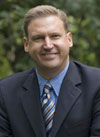
Jay Urban
Why choose this candidate?
I am running because I have come to believe that a candidate, not from the board, but not an independent candidate either, presents the best opportunity to evaluate and unite the bar moving forward, whether it is a voluntary or mandatory bar.
I am an attorney that does one thing only: helps solve complicated, expensive problems in a litigation system that often pits polar opposite points of view, and tries to resolve matters by building consensus or at least understanding of the issues to find middle ground. That background uniquely qualifies me, at this time, to deal with these important issues on the future of the bar. Serving as a member of the bar over the last 18 years, and in many other bar organizations, I have come to understand a problem that is affecting the State Bar, and am offering an “outside the board” perspective to change the way that the State Bar delivers services – tomorrow and into the future, in a changing world. This is a commitment to participate in listening to our membership and helping to implement the necessary changes to our organization, changes that bar members have been asking, some demanding, for years.
While I have strong opinions regarding changes that we need to make to the State Bar organizational structure to deal with the disconnect some Wisconsin lawyers feel regarding the mandatory bar, and the lack of efficiency – perceived or actual – in the organization, or some questionable value to certain services, the most important touch point of my candidacy is this: THE BAR IS ITS MEMBERS. That is, the Bar needs to respond to the needs of its members, whether it is voluntary or mandatory, each and every day.
Most pressing issue?
There are actually two key issues facing the bar: the voluntary debate which is infused with the issue of member services and whether members are getting or perceiving “value” from the bar; the second is defining the actual practice of law, something the supreme court should immediately do in response to the October 2009 Wisconsin Lawyer editorial. Both have as their focus one theme: membership services.
To be clear, like the president elected in three of the five elections for president, I support a voluntary bar. That does not mean that I favor a disbanded bar, or a disorganized bar. I am running TO HELP MAKE A BETTER, MORE RESPONSIVE BAR, whichever type of bar it turns out to be. I believe that a voluntary bar will be more responsive to the needs of its members, and in turn will be more relevant and agile in its service to the members and to the public. To be more clear, what type of bar it will be should be OUR CHOICE, MEMBERS’ CHOICE, and then presented to the supreme court. This has not happened, and it should, and with your help, it will. It takes time, and effort, and the choice will likely take longer than a few elections. This one counts, too. Over the last four years, the major debate that has dominated the election for State Bar president has been the issue of the mandatory versus a voluntary bar. Although the ultimate decision regarding this issue rests with the supreme court, I support President Doug Kammer’s and President-elect Jim Boll’s hard-working and honest continuing attempts to obtain a representative opinion from bar members regarding the mandatory bar, and then to implement the opinions of the members, just like any democratic organization would do. This opinion should be the driving factor on how the bar proceeds on this issue.
I would like to add that at times in the debate over the mandatory bar, little attention has been given to the underlying issue in this debate, and it was raised by President-elect Boll in his campaign last round: Why do some members of the bar feel that bar membership does not offer any tangible benefit? To continue to address and resolve this issue is why I’m running for State Bar president. Some feel that there are tangible benefits to bar membership but, on principle, have concluded the bar should be voluntary. Others feel the bar does not offer tangible benefits or disagree with the types of benefits the bar offers. Whether you favor a mandatory bar or a voluntary bar, we should all be in favor of strengthening our organization so that lawyers in Wisconsin feel bar membership offers real and tangible benefits.
• Related: Milwaukee lawyers run for Judicial Council seat; nonresidents vie for secretary
